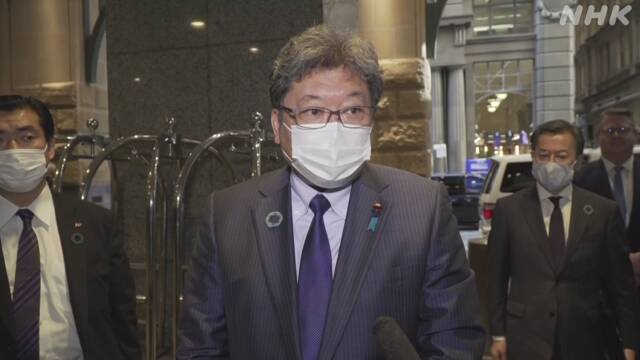Minister of Economy, Trade and Industry Hagita, who attended a meeting of the Ministers of Energy of Quad, the framework of the four countries of Japan, the United States and Australia, said that LNG = increased production and stable supply of liquefied natural gas to the United States and Australia, which produce natural gas. He made a request and expressed his recognition that he had gained an understanding of Japan's position.
The first quad meeting by the Minister of Energy was held in Sydney, Australia, and was attended by Minister of Economy, Trade and Industry Hagita from Japan.
Japan procures nearly 10% of all natural gas imports from Russia through interests such as "Sakhalin 2", but securing stable suppliers is an issue.
For this reason, Minister Hagiuda recognized that he gained an understanding of Japan's position by individually meeting with the ministers in charge of the United States and Australia, which are the producing countries of natural gas, and requesting an increase in LNG production and a stable supply. Shown.
At the quad meeting, each country agreed to cooperate in the development of clean energy such as hydrogen and fuel ammonia, and to secure energy security such as strengthening the supply network of storage batteries.
After the meeting, Minister of Economy, Trade and Industry Hagiuda said, "The importance of imports from countries that share values such as the United States and Australia is increasing over LNG, which is concerned about global tight supply and demand. Increased production and stability of LNG. We requested both countries to supply and showed an understanding of Japan's position. "
In addition, he expressed his intention to proactively provide financial support to Japanese companies that procure LNG and make new investments, which will lead to strengthening of procurement.
On the other hand, Minister Hagiuda responded to the question of whether the four countries were in step with each other over the elimination of energy from Russia. All countries understood that Japan continues to import LNG from Sakhalin. " As a result, it was difficult to take a consistent response.
Energy circumstances of the four quad countries
The four quad countries have different energy affairs, and there are also differences in their attitude toward economic sanctions against Russia.
The United States does not have to rely on energy for Russia, as it has abundant domestic oil and natural gas.
Australia is also an exporter of resources blessed with coal and natural gas.
For this reason, both countries are imposing economic sanctions such as banning the import of crude oil and natural gas from Russia, and are tightening their tightening on Russia.
On the other hand, India, which has a population of 1.4 billion, is expected to continue to import domestic energy consumption, so it continues to import oil and other products from Russia and does not participate in economic sanctions.
In response, Japan has stated that it will not import oil in principle, in step with the United States and other countries.
However, with regard to LNG, nearly 10% of the total import volume depends on Russian products, most of which comes from "Sakhalin 2", which is funded by a major Japanese trading company.
Regarding "Sakhalin 2", on the 30th of last month, Russian President Vladimir Putin signed a presidential decree ordering to change the business entity to a newly established Russian company, and it is unclear whether Japanese companies can maintain their interests.
For this reason, along with the United States and Australia, which are tightening sanctions on Russia, it is difficult to make a difficult decision as to whether Japan can maintain a consistent response.
The status of LNG procurement in Japan
Japan cools natural gas to minus 162 degrees Celsius and then ships it to Japan in the form of LNG = liquefied natural gas, and imports almost all of it from overseas.
According to the Ministry of Finance's trade statistics, the amount of LNG imported by Japan by country is as of 2021,
▽ Australia 35.8%,
▽ Malaysia 13.6%,
▽ Qatar 12.1%,
▽ America 9.5%,
▽ Russia is 8.8%.
Most of the imports from Russia are produced in "Sakhalin 2".
Compared to the Middle East, Sakhalin is closer to Japan and can be transported in about 3 days, and since there are no conflict areas on the transportation route, the risk of accidents and other troubles can be reduced.
For these reasons, "Sakhalin 2" is positioned as an important energy security project for Japan as a supply base that can secure LNG at a relatively low price over the long term.
However, Russian President Vladimir Putin signed a presidential decree on the 30th of last month ordering the change of the business entity of "Sakhalin 2" to a newly established Russian company, and it is unclear whether it can be procured as before.
In addition, a fire broke out early last month at "Freeport," an export base in Texas, in the southern United States, where Osaka Gas and others procure LNG.
At Freeport, partial resumption of operations will be in early October, and full operation will be at the end of the year, raising concerns about whether LNG will continue to be supplied in a stable manner.

